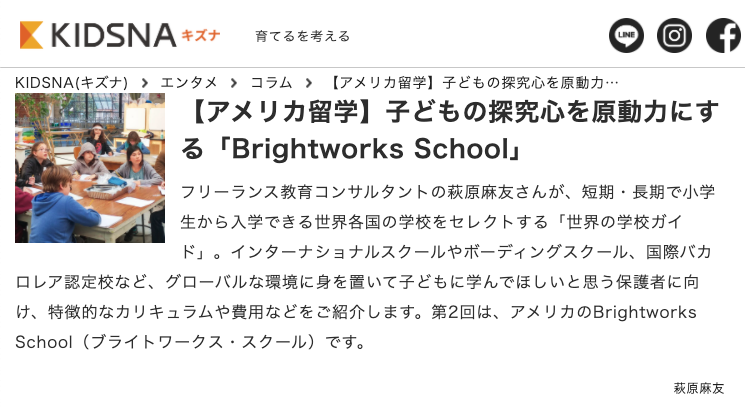先日、KIDSNAという子育て中の保護者向けメディアに、二回目の学校紹介の記事を取り上げていただきました。
一回目の記事で取り上げたFay Schoolはこちらから。
さてさて、サンフランシスコにあるBrightworks Schoolには私は訪れたことはないのですが、今回記事を書くにあたって、役員のAaron Edenさんにオンライン取材をさせていただきました。
この方、とても気さくで話も面白く、良いこと話してくれるんですけど、ことあるごとに表現が反骨的で反権威主義的で極端で刺激的で、聞いているこっちはヒヤヒヤしました(笑)
Kidsnaさんの記事はふんわり柔らかく、誰に読んでもらっても大丈夫なように意識して書きましたが、実際の取材ではちょっと使えないような表現がバンバン出てきちゃって。
なんかこの雰囲気、どっかの学校の人に似ているなと思ったら、私も訪れたことがあるこちらの学校でも働いていたことがあったとのこと。納得。共通の知り合いまでいました(笑)
ただ取材としては大変おもしろかったので、せっかくのAaron節をこの記事でシェアします。
一般的な学校はロボット製造所である
取材でAaronさんは、典型的な学校は他でもないロボットをつくる場所だと断言します。つまり、指示待ち人間の生産ですね。
I call what you call traditional schools conventional schools, because there’s very little that’s traditional about our education system is about 100 years old and how we educate and it’s incredibly radical compared to how human beings have learned for hundreds of thousands of years, right. So, so we actually think that our way of educating is much more traditional…
今でこそ一般的な学校の姿は、決して”伝統的”な学習の姿ではない。むしろ、Brightworksでやっているような教育こそがより伝統的な学びの姿であると。
そこで、古典(英語圏だとラテン語、ギリシャ・ローマ神話からシェイクスピアや、ヘミングウェイなどより近代的なものも含めて)を学ぶことの意義をBrightworksでどう捉えているか、私から聞いてみました。
するとBrightworksでは、まず「なぜこれらの作品が古典たらしめられているのか」「誰がこれらの価値を決めたのか」など、そもそもなぜ古典、というところから生徒と先生同士で対話を重ねるといいます。
One of the big differences between when we teach the classics, is that almost everybody involved is going to remember it as a positive experience than when conventional schools teach the classics. I would argue, for most kids the most effective thing [conventional schools are] doing is teaching them to not like the classics. To not like learning. To not like reading…What we were actually taught was how to not like learning and how to not like the classics.
一般的な学校では、古典を取り扱ったとしても、学ぶことや読むことを嫌いにさせるだけ。なぜなら古典を読んだり考えたりすることをポジティブな体験として提供していないから。とのことです。
うなずくことが多いのですが、Kidsnaの記事には含めませんでした。いろんな読者さんがいると思うのでね。でも私の読者さんならこれくらいの刺激、楽しんで頂けるかと。
日本の保護者に伝えたいこと
日本の保護者を代表して、私からAaronさんに質問をしてみました。
子どもから答えがわからない質問をされたら、どうすればいい?
One of the most important things adults can say to kids is, “I don’t know”. And “how about we find out together.” Those are the two most important things for adults to learn how to say to kids.
そういうときは「わからない」「一緒に考えよう/調べよう」というのがいいそうです。
さらに、Aaron節は続きます。
Adults try to pretend to kids like they are perfect. They are lying and they know it. They are ruining our trust with them…we like to think that we’re supposed to teach them when really we should be exploring the world with them…If we are ever using threats with our kids to do basic things, we have no hope of being good teachers for them. Because what we’re teaching them, is how to abuse power…The lesson that they’re going to remember is that it’s not only okay but necessary that you get yourself in a position of power over other people…
When we move from command and control to co-creation, we get, whether it’s parenting, or teaching, then we get the outcomes we want for our kids
子どもに必要なのは「司令」や「教育」ではなく、「一緒に」探求したり創ったりすることである、とのこと。
変に大人ぶったりしないで、子どもと目線を合わせて、子どもを思い通りに動かそうとしないほうが、望ましい結果につがるよ、とのことでした。
日本の教育関係者へのメッセージ
Brightworksには、同じ理念で短期プログラムを運営するTinkering Schoolという姉妹組織があります。
Aaronさんが、もし日本のお客さんにも需要があるなら積極的につながっていきたい!とのことでしたので、もし興味のある教育機関がありましたらぜひお声がけください。twitter経由でも大丈夫です。
生徒の英語力は問わないとのことです。
ハンズ・オン、協働、課題解決型、探求学習、生徒主導型あたりのキーワードにピンと来る方で、教育的プログラムの導入を検討されている方には特におすすめです。
Brightworks Schoolの詳細や理念がわかる記事は、Kidsnaさんで書いているのでぜひ読んでみてください。
